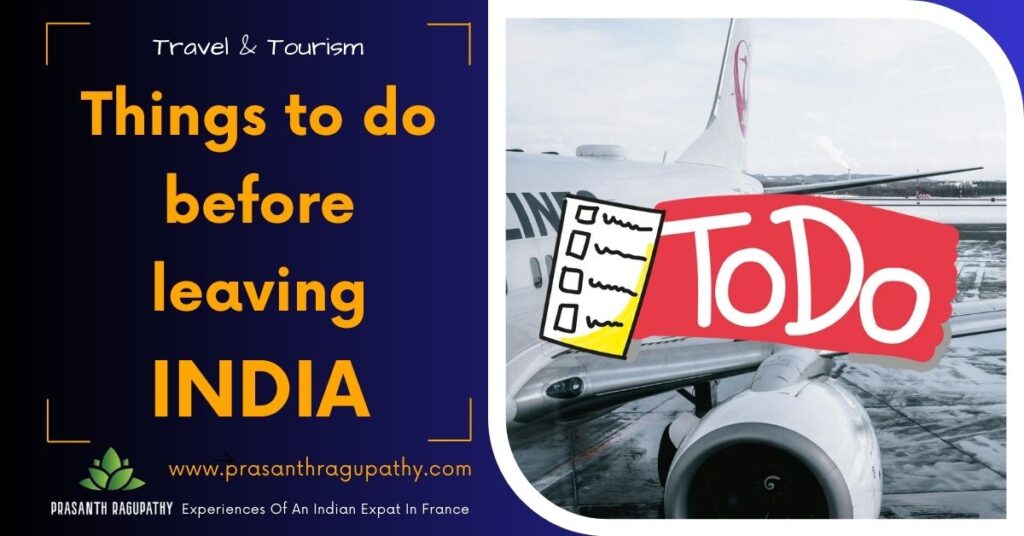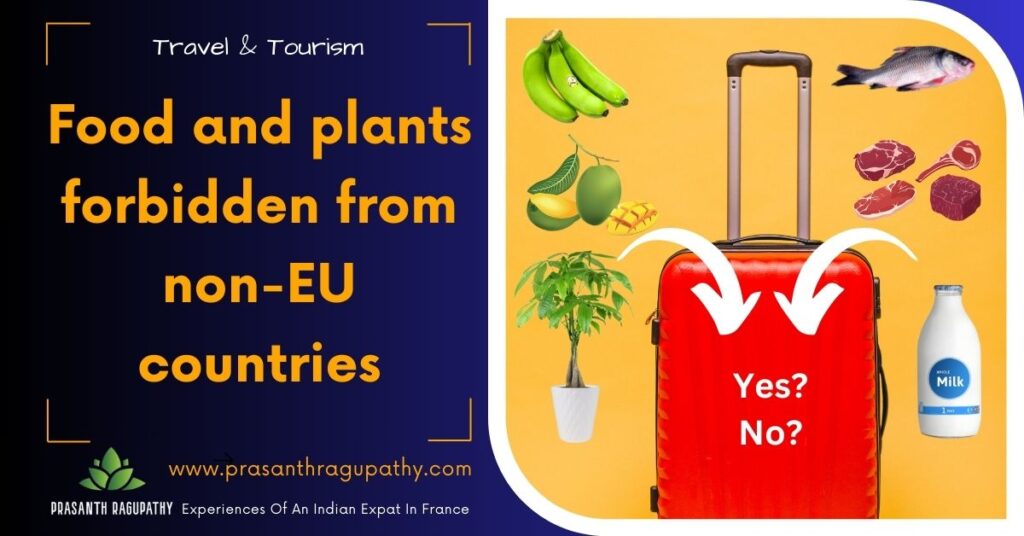Published on: July 29, 2024 | By: @rprasanth_kumar | Last updated on: September 27, 2024
Moving to France is exciting, but it requires careful preparation. This checklist covers everything from securing essential documents to packing appropriately, ensuring a smooth and enjoyable journey to one of the world’s most captivating destinations.
Table of Contents 📚
- Accommodation
- Documentation (including Apostille)
- Prerequisites (Birth & Marriage Certificates)
- Apostille Process
- French Translation
- Passport Based Birth Certificate
- Passport & Visa
- Flight Tickets & Travel Itinerary
- Forex & Payments
- Travel Insurance
- French Language
- Doctor Visit
- Packing List
- Final List of Documents
- Emergency Contacts
Accommodation 🏠
- Start searching for accommodations in advance.
- Some visa applications for students, tourists and visitors must be submitted along with a valid accommodation proof.
- Tourists and visitors can consider options like hotels, hostels, Airbnb, or vacation rentals depending on your budget and preferences.
- Websites like Booking.com, AirBnb, SeLoger, Le Bon Coin, and PAP are some useful options to find accommodations.
- Students can refer to this detailed guide, Everything to know about student accommodation in France?
- For salaried professionals, their employers often book a temporary accommodation for 1-2 months. So, you should check with your employer if its possible.

Documentation 📒
Apostilled personal documents are required for many purposes in France including social security, CAF, visa renewals, etc. The following documents must be apostilled before leaving India. They are not required for the visa application.
- Birth Certificate (BC)
- Marriage Certificate (MC, if married)
Other documents such as your degree certificates, etc. do not have to be apostilled, except when explicitly asked. For more detail about the apostille process, please refer to the detailed article given below.
Apostille Process of Indian Birth and Marriage Certificates
Passport & Visa ✈️
Ensure your passport is valid for at least 6 months beyond your intended stay. If your passport is expiring in less than a year, it is recommended to renew it before the trip. Check the visa requirements and start the application 3 months before the planned travel date.
Here are some useful resources to help your French visa applications.
- VFS Checklist: Documents for French Student Visa application
- VFS Checklist: Documents for Schengen Tourist Visa application
- Salary visa Application experience
- Family Reunification: How to bring your family to France?
- Short-stay Visitor Visa Application Experience by Nikitha
- Long-stay Visitor Visa Application experience – Mumbai
- Long-stay Visitor Visa Application experience – Delhi
- Schengen Tourist Visa Application experience – Delhi
- Dependent visa for spouse and children of Passport Talent visa holders
Flight Tickets & Travel Itinerary ✈️
- Book your flights early to get the best deals.
- Keep copies of your booking confirmations and boarding passes.
- Plan your travel itinerary in advance, including major attractions, activities, and day trips. Make reservations for popular attractions and restaurants that may require advance booking.
- Many airlines have special offers for students including an additional 23kg free of cost.
Forex & Payment 💶
- Currency: Get some Euros (€) for immediate expenses upon arrival. You can also get a forex card, if required.
- But it is recommended to stop using it after opening a French bank account.
- Use ATMs for cash withdrawals. They provide better exchange rates compared to airport exchanges.
- Payment Methods: Carry a mix of payment methods, including forex/credit/debit cards and cash. Contactless payment is widely accepted in France.
Travel Insurance
Purchase comprehensive travel insurance that covers medical emergencies, accidents, theft, and trip cancellations.
- The coverage should be a minimum of 30,000 EUR. It should cover all the expenses related to emergency care, hospitalization, ambulance transport, scans, surgery, out-patient treatment, medication, repatriation assistance, personal liability, death, etc.
- The insurance is recommended for everyone because it takes a minimum of 2 to 3 months for creating a temporary Social Security Number in France.
- There are Schengen travel insurances for students. A few examples are, reliancegeneral, tataaig, and bajajallianz.
- Also, Which travel insurance for a long-stay visitor visa?
French Language 🇫🇷
Learn some basic French phrases for greetings, directions, and common interactions.
- Download a translation app or carry a French-English phrasebook to help with communication.
- If you have sufficient time, try to complete a few levels in French.
- For students, it is highly recommended to learn at least A2 level before arriving in France.
English | Français |
| Good morning | Bonjour (morning) |
| Good afternoon | Bonjour (afternoon) |
| Good evening | Bonsoir (from 18h00) |
| Goodbye | Au revoir |
| See you soon | À bientôt |
| Yes | Oui |
| No | Non |
| Please | S’il vous plaît |
| Thank you | Merci |
| Sorry | Pardon |
| You’re welcome | Il n’y a pas de quoi |
| My name is… | Je m’appelle |
| I don’t understand | Je ne comprends pas |
| I don’t speak French | Je ne parle pas français |
Doctor Visit 🩺
Visit a doctor and have a basic medical checkup done.
- Vaccinations: Check if any vaccinations are required or recommended.
- Medications: Carry a basic first-aid kit and enough prescription medications for your trip duration.
Packing List 🧳
Pack according to the season and activities. France experiences a variety of climates.
- Summer: Light clothing, hat, sunglasses, and sunscreen.
- Winter: Warm clothing, layers, a heavy coat, gloves, and scarves. You can buy them in France because they will be suitable to the local conditions here.
- Spring/Autumn: Layered clothing, a light jacket, and comfortable walking shoes.
- Accessories: Umbrella and raincoat.
- Toiletries: Travel-size shampoo, conditioner, toothpaste, toothbrush, and personal hygiene items.
- Electronics: Phone, charger, power bank, camera, and EU travel adapters.
- Cooking: Indian pressure cooker (if required). Most other vessels can be bought in France too. So, use the luggage space for other important things.
- Food: Some Indian instant food to manage the initial days in France. For example: Maggi noodles, Dosa, Upma, Chana Masala, Dal Makhani, etc. Also, Snacks, sweets. Coffee powder & Tea, Spices, Pickles, etc. What food and plants can you carry in your luggage to EU countries?
Note: I will add a separate article with a detailed list of things to pack for France.
List of Documents 📒
Originals and photocopies of the following documents will be very helpful during and after the trip.
- Passport
- Visa
- Tickets for flight, train, bus, etc.
- Travel itinerary and Map
- Contact information of your contacts in France.
- Travel insurance attestation
- College admission or Job contract or Invitation letter
- Proof of accommodation
- Degree and Transcripts
- Birth certificate (apostilled);
- Marriage Certificate (postilled)
- Driving license and IDP (optional)
Emergency contacts 🚨
In times of crisis, knowing how to swiftly reach emergency services can make all the difference between life and death. So, this article lists the various emergency phone numbers in France, things to say during the call, and also some useful French vocabulary.
Support This Blog!
If you’ve found my articles helpful, interesting or saving your time and you want to say thanks, a cup of coffee is very much appreciated!. It helps in running this website free for the readers.



